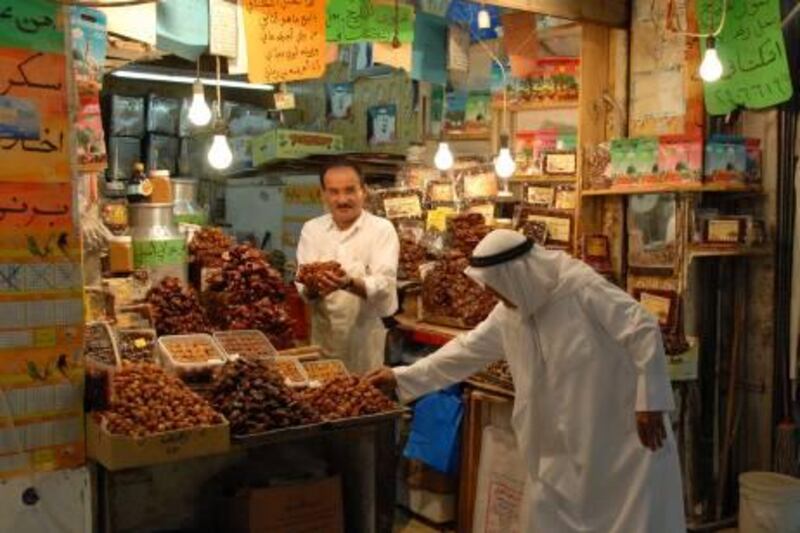KUWAIT CITY // In the centre of Kuwait City, Souk al Mubarakiya is a kaleidoscope of covered streets with pigeonhole shops, Iranian restaurants and diwaniyas where royals used to rub shoulders with their subjects. Its spice scented alleyways seem timeless.
The souk's walls, where old Kuwaitis rest in the shade as veiled women lead children through the busy streets, were rebuilt after Iraqi troops pillaged the area during the 1990 occupation.
This week Kuwait celebrates its 50th anniversary and while the traditions of the market go back to when the city was one of the Gulf's major trading hubs, the make-up of Kuwait's society has undergone several dramatic shifts since independence from Britain.
"I was born in this city when my father worked in the fig trade," said Khaled al Baijan, a 36-year-old Saudi who was visiting his Kuwaiti uncle, as he sipped lemon tea in one of the cafes: a few ragtag benches in a clearing among the streets. "There were far fewer people back then, and they were from different places. Omanis used to work in the perfume shops; now it's all Indians."
Kuwait's population was 467,000 in 1965, around two thirds of whom were foreign workers. By 2008, the proportion of locals to expatriates was roughly the same but the population had exploded by more than sevenfold to reach 3.3 million.
In the past 50 years, the main source of Kuwait's foreign workforce has shifted east. Around 450,000 Palestinians expatriates living in Kuwaiti were mostly expelled after the liberation because of their leader's support for Iraq. Now, about 600,000 Indians are thought to make up the largest foreign community, followed by Egyptians, Bangladeshis, Pakistanis and Sri Lankans.
It is not just the makeup of foreign community that has changed. The royal family paved the way for Bedouin tribesmen to get Kuwaiti citizenship in the 1960s and 1970s to staff a booming oil industry and balance the power of the opposition in parliament. The government's traditional opponents were liberals from the hadar, citizens who had given up the nomadic lifestyle long ago.
By 2000, the proportion of tribesmen had grown to make up 45 per cent of the electorate, eclipsing the Sunni hadar, who accounted for 35 per cent, Michael Herb, an academic, estimated from Kuwaiti sources in 2005. Shiites, who also have long roots in the city, make up the majority of the rest. The shifting demographic can be a source of contention between old and new residents and sectarian groups.
"There used to be more of us than them down here, now it's the other way round," said a 50-year-old member of a prominent Shiite family who asked not to be named because of the sensitivity of the issue.
"The tribes don't like the Shiites and we don't like how they talk," he explained, while puffing on a shisha in a cavernous cafe in the souk. "Kuwait is the best country in the Arab world: number one. It's not like Egypt. We have jobs and money and houses. But the tribes, they always want more."
When the tribes became Kuwaiti they reaped the benefits of citizenship including easy, well-paid jobs in government, free services, and a raft of subsidies. Shamlan Alessa, a political scientist at Kuwait University, said in the early 1980s, their representatives started to become the majority in parliament.
"The majority was in the beginning very loyal, since the royal family employed them in the army and the police," he said.
But as the next, more educated, generation grew they became aware of their poverty relative to the rich merchant class, he said. They realised they could get more benefits by attacking the government and became aggressive opponents. Ministers who stood in their way have often faced a parliamentary interpellation.
Bickering between the government and parliament has distracted the assembly from creating legislation. Mr Alessa said the royal family has tried to solve "the mess" by reshuffling the cabinet or dissolving the parliament, or buying the loyalty of the deputies with money, land or favouritism.
"They're like sharks, they only care about their own interests and tribal interests," he said.
The tribes argue that they are fighting for what is rightfully theirs and that the oil that has made Kuwait rich comes from underneath lands that they have roamed for aeons.
The relationship between the two communities is largely amiable, but an opposition rally in December proved that tensions simmering beneath the surface can sometimes erupt into violence. A citizen from the hadar community who attended the event, Mohammed al Juwaihel, received a severe beating from a predominantly tribal crowd. He had previously said on television that true Kuwaitis came from inside the old city's walls, a definition that excludes Bedouins.
Abdullah Alhajeri, a professor of modern history at Kuwait University, has said in the past that naming the state of Kuwait after the old city in 1961 gave its residents the impression that they are the true citizens, and not the Bedouins of the desert.
"If you go to anyone in the street and you ask him, 'who's a Kuwaiti', everyone will say, 'I'm the Kuwaiti, the others are not'," Mr Alhajeri said.





